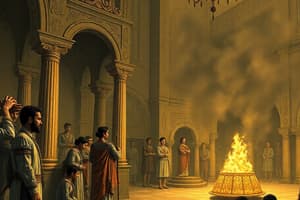Podcast
Questions and Answers
Which of the following best describes Rizal's primary method of criticizing Spanish colonial rule?
Which of the following best describes Rizal's primary method of criticizing Spanish colonial rule?
- Publicly denouncing Spanish officials in formal government proceedings.
- Forming political parties to openly challenge the Spanish government.
- Using metaphorical narratives in his literary works to expose injustices. (correct)
- Directly engaging in armed rebellion against the Spanish authorities.
How did exploitative taxation contribute to the social problems during the Spanish colonial period?
How did exploitative taxation contribute to the social problems during the Spanish colonial period?
- It led to widespread poverty and perpetual debt among Filipinos. (correct)
- It funded infrastructure projects that disproportionately benefited the Spanish elite.
- It provided the Spanish colonial government with resources to improve public education.
- It encouraged Filipinos to engage in entrepreneurial activities to meet tax obligations.
If a modern-day activist were to draw inspiration from Rizal's writings to address contemporary social issues, which approach would most closely align with Rizal's?
If a modern-day activist were to draw inspiration from Rizal's writings to address contemporary social issues, which approach would most closely align with Rizal's?
- Creating art and literature that subtly critiques systemic injustices. (correct)
- Organizing large-scale protests to directly confront those in power.
- Negotiating directly with government officials to implement policy changes.
- Establishing underground networks to resist government control.
Which of the following scenarios exemplifies the 'abuse of power' that was prevalent during the Spanish colonial era, as highlighted in Rizal's works?
Which of the following scenarios exemplifies the 'abuse of power' that was prevalent during the Spanish colonial era, as highlighted in Rizal's works?
Which of the following most accurately reflects the relationship between Rizal's writings and the enumeration of the '11 evils'?
Which of the following most accurately reflects the relationship between Rizal's writings and the enumeration of the '11 evils'?
Which of the following best describes the 'falla' during the Spanish colonial period in the Philippines?
Which of the following best describes the 'falla' during the Spanish colonial period in the Philippines?
How did the friars' influence contribute to the issues faced by Filipinos during the Spanish colonial era?
How did the friars' influence contribute to the issues faced by Filipinos during the Spanish colonial era?
What was the prevailing characteristic of the education system during the Spanish colonial period, and how did it impact Filipinos?
What was the prevailing characteristic of the education system during the Spanish colonial period, and how did it impact Filipinos?
Which statement accurately reflects the limitations on freedom of speech during the Spanish colonial period in the Philippines?
Which statement accurately reflects the limitations on freedom of speech during the Spanish colonial period in the Philippines?
How did racial discrimination manifest itself in the Philippines during the Spanish colonial period?
How did racial discrimination manifest itself in the Philippines during the Spanish colonial period?
Flashcards
Tyranny and Oppression
Tyranny and Oppression
Absolute rule by the Spanish colonial government, often ignoring the welfare of Filipinos.
Exploitative Taxation
Exploitative Taxation
Excessive taxes imposed on Filipinos, such as the tributo, bandala, and cedula personal.
Jose Rizal
Jose Rizal
Philippine's most influential figures who was critical of the Spanish Colonial Government and the Catholic Church.
"The Philippines: A Century Hence"
"The Philippines: A Century Hence"
Signup and view all the flashcards
Forced Labor
Forced Labor
Signup and view all the flashcards
Land Grabbing
Land Grabbing
Signup and view all the flashcards
Polo y Servicio
Polo y Servicio
Signup and view all the flashcards
Abuses by Friars
Abuses by Friars
Signup and view all the flashcards
Restricted Education
Restricted Education
Signup and view all the flashcards
Suppressed Speech
Suppressed Speech
Signup and view all the flashcards
Study Notes
- Rizal 101 focuses on life and works of Rizal
Lesson Objectives
- Review Rizal's predictions
- Enumerate social problems during the Spanish Era
- Apply Rizal's ideas for socially and politically aware individuals
Rizal's Works
- Rizal was critical of the Spain's Colonial Government and the Catholic Church
- Rizal detailed the abuses of Filipinos, leading to his execution
- Writings include "The Philippines: A Century Hence", "Noli Me Tangere", and "El Filibusterismo."
- Rizal's writings exposed abuses by the Spanish government and religious entities.
- Filipino scholars have compiled key injustices during Rizal's time, although he didn't enumerate 11 evils.
11 Evils
- Tyranny and Oppression: The Spanish government ruled with absolute authority and disregarded the welfare of Filipinos.
- Abuse of power led to widespread corruption and exploitation by Spanish officials
- Exploitative Taxation: Filipinos had excessive taxes, like the tributo (tribute), bandala, and cedula personal (residence tax).
- Taxes led to poverty and debt for Filipinos
- Forced Labor: Filipino men had unpaid labor performing public works and infrastructure projects.
- Filipinos could get out of this via "falla" by paying ¾ of their daily wage
- Land Grabbing: Large land tracts were turned into haciendas owned by Spanish authorities, individuals, and religious orders.
- Filipinos became tenants on their own land.
- Abuses by Friars: Spanish friars had enormous power that exceeded government officials' and committed sexual misconduct.
- Access to Education: Education was controlled by the church, elitist, and left many Filipinos uneducated and illiterate.
- Curriculum was religious education.
- Freedom of Speech: Filipinos could not freely express opinions or publish materials against the Spanish colonial government or church.
- It also led to severe punishment and execution.
- Racial Discrimination: Spaniards saw Filipinos as inferior, limiting social and economic opportunities to favor Spaniards and mestizos.
- Injustice: The judicial system favored Spaniards and the elite while Filipinos were often discriminated against and were denied trials.
- Military Abuses: The Guardia Civil abused power and harassed ordinary Filipinos with extortion, sexual harassment, and murder.
- Exploitation of Resources: The colonial government exploited Philippine natural resources for Spain and didn't fairly pay Filipinos.
Conclusion
- Injustices and abuses fueled Filipino resentment, captured in Rizal's works.
- Efforts to expose evils contributed to Filipino nationalism and fight for independence from Spanish rule.
- Rizal's writings shows importance of justice, equality, and fighting oppression.
Studying That Suits You
Use AI to generate personalized quizzes and flashcards to suit your learning preferences.
Related Documents
Description
This quiz explores Rizal's methods of criticizing Spanish rule, the impact of exploitative taxation, and the relevance of his writings to contemporary social issues. It also addresses the abuse of power during the Spanish colonial era and the relationship between Rizal's works and the '11 evils'.




